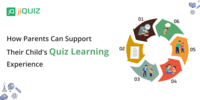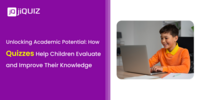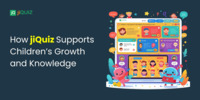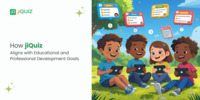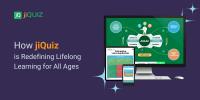- Apr 30, 2025
- Updates
- 1041
Share this post on:
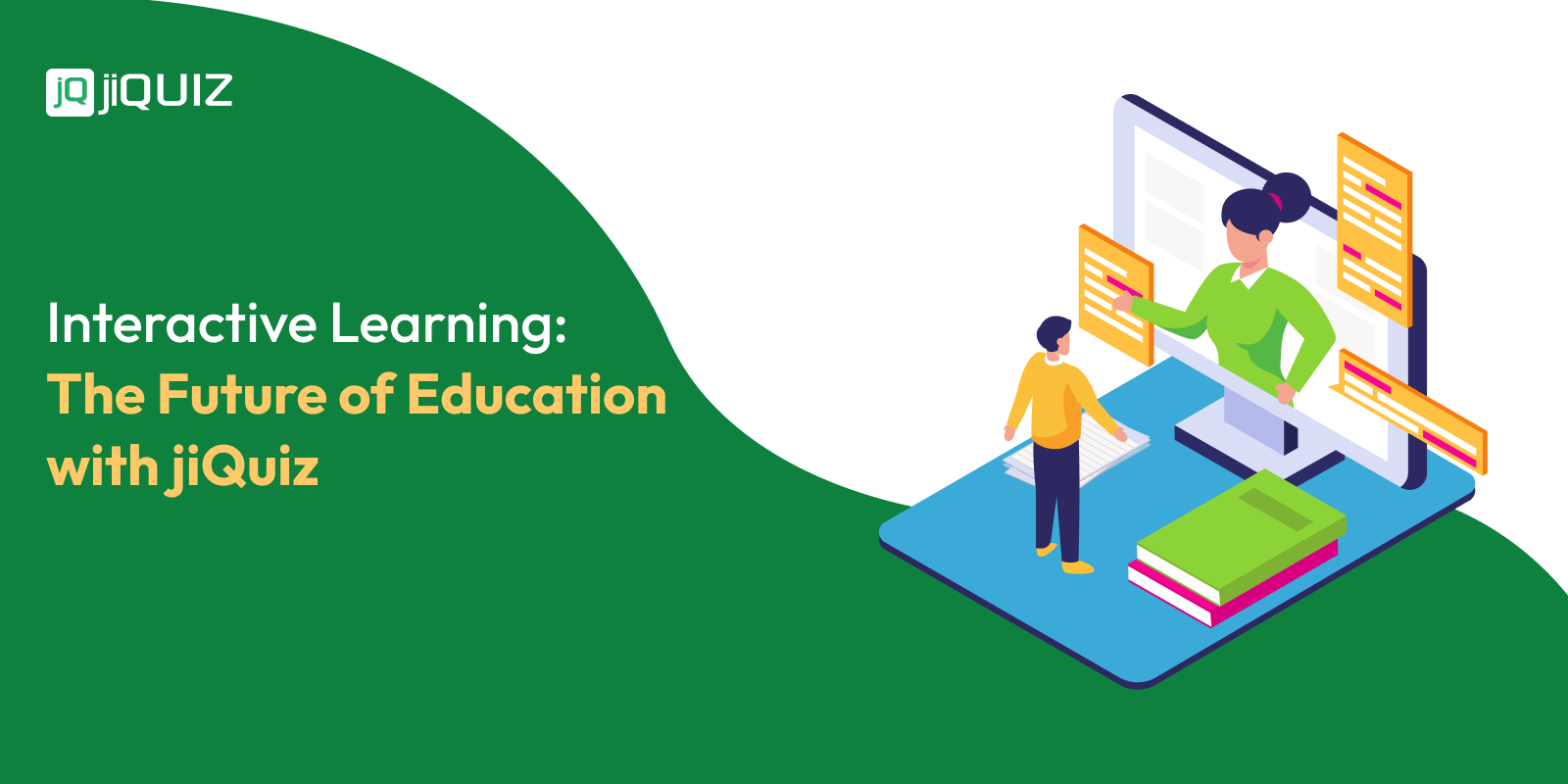
The landscape of education is undergoing a profound transformation, driven by technology and innovative teaching methodologies. Traditional rote learning, characterized by memorization and passive absorption of information, is rapidly giving way to interactive learning—a dynamic, engaging, and student-centered approach. Interactive learning leverages technology to foster critical thinking, collaboration, and knowledge retention, making it the cornerstone of modern education. At the forefront of this revolution is jiQuiz, a platform designed to make learning fun, accessible, and effective for children. This article explores why interactive learning is the future of education and how jiQuiz is shaping this evolution.
The Shift to Interactive Learning
Interactive learning represents a paradigm shift from conventional teaching methods. Instead of students passively receiving information, they actively participate in the learning process through quizzes, games, and multimedia content. This approach aligns with the needs of today’s tech-savvy generation, who are accustomed to instant feedback and engaging digital experiences. Research shows that interactive learning enhances knowledge retention by up to 60% compared to traditional methods, as it encourages students to apply concepts in real-time.
The rise of digital platforms has made interactive learning more accessible than ever. Tools like quizzes, virtual simulations, and gamified assessments allow educators to create personalized learning experiences that cater to diverse learning styles. By incorporating elements like leaderboards, points, and instant feedback, these platforms transform education into an engaging adventure, motivating students to take ownership of their learning.
Why Interactive Learning Matters
Interactive learning is not just a trend—it’s a necessity in a rapidly changing world. Here are some key reasons why it’s shaping the future of education:
1. Boosting Engagement and Motivation
Children today are surrounded by interactive media, from video games to social platforms. Traditional textbooks and lectures often struggle to compete for their attention. Interactive learning bridges this gap by incorporating game-like elements, such as rewards, challenges, and competition, to keep students engaged. For instance, platforms like jiQuiz use leaderboards and fun avatars to create a sense of friendly rivalry, making learning an exciting experience. Studies indicate that gamified learning can increase student motivation by 48%, as it taps into their intrinsic desire to achieve and improve.
2. Enhancing Knowledge Retention
Quizzes and interactive assessments are powerful tools for reinforcing knowledge. When students actively recall information to answer questions, they strengthen neural connections, leading to better long-term retention. jiQuiz, for example, offers quizzes across subjects like math, science, and history, allowing students to practice and internalize concepts in a fun format. The immediate feedback provided after each question helps students correct mistakes in real-time, fostering a deeper understanding of the material.
3. Personalizing the Learning Experience
Every student learns at their own pace and has unique strengths and weaknesses. Interactive learning platforms can adapt to individual needs, offering tailored content and difficulty levels. jiQuiz uses AI-powered features to recommend quizzes based on a student’s performance, ensuring they are challenged without feeling overwhelmed. This personalized approach reduces frustration and builds confidence, enabling students to progress at their own speed.
4. Promoting Critical Thinking and Collaboration
Interactive learning encourages students to think critically and solve problems creatively. Scenario-based questions and team-based quiz modes, like those offered by jiQuiz, foster collaboration and communication skills. By working together to answer questions or competing in team challenges, students develop essential 21st-century skills that prepare them for future careers.
The Role of Quizzes in Interactive Learning
Quizzes are a cornerstone of interactive learning, offering a versatile and effective way to assess and reinforce knowledge. Unlike traditional tests, which can be stressful, quizzes are often designed to be engaging and low-pressure. They provide instant feedback, allowing students to learn from their mistakes immediately. Platforms like jiQuiz take this a step further by incorporating multimedia elements, such as images and videos, to make quizzes more dynamic and appealing.
Quizzes also serve as a formative assessment tool, helping teachers identify gaps in understanding and adjust their instruction accordingly. With jiQuiz, educators can access detailed performance reports that highlight areas where students excel or need support, enabling data-driven teaching strategies. This real-time insight is invaluable in ensuring that no student is left behind.
How jiQuiz is Revolutionizing Education
jiQuiz is a leading example of how interactive learning can transform education. Designed specifically for children, jiQuiz combines fun and education in a seamless, user-friendly platform. Here’s how jiQuiz stands out:
1. Diverse and Engaging Content
jiQuiz offers a vast library of quizzes covering a wide range of subjects, from language arts to STEM. The platform’s diverse categories ensure that every child finds topics that spark their interest. Whether it’s exploring historical events or solving math puzzles, jiQuiz makes learning an adventure.
2. Gamified Learning Experience
With features like leaderboards, power-ups, and fun memes, jiQuiz turns quizzes into exciting games. These gamified elements keep students motivated and eager to participate, even during challenging tasks. For example, the Team Mode encourages collaboration, while power-ups add an element of strategy, making every quiz session lively and interactive.
3. Accessibility and Flexibility
jiQuiz is cloud-based and compatible with any device, from smartphones to laptops, making it accessible to students anytime, anywhere. Whether in the classroom or at Ascending, this flexibility supports remote learning and ensures continuity in education.
4. AI-Powered Personalization
jiQuiz leverages AI to create and recommend quizzes tailored to each student’s needs. Teachers can generate custom content quickly, while students benefit from adaptive difficulty levels and personalized feedback. This technology streamlines the quiz creation process and enhances the learning experience.
5. Support for Diverse Learners
jiQuiz is committed to inclusivity, offering over 25 accessibility features, such as read-aloud options and text translation. These tools ensure that students with special needs, including those with IEPs, can participate fully in the learning process.
The Future of Education with Interactive Learning
As education continues to evolve, interactive learning will play an increasingly central role. The integration of AI, gamification, and data analytics will enable educators to create more effective and engaging learning experiences. Platforms like jiQuiz are paving the way by demonstrating how technology can make education accessible, personalized, and fun.
The future of education lies in empowering students to become active participants in their learning journey. By fostering curiosity, critical thinking, and collaboration, interactive learning prepares students for a world that values adaptability and innovation. As schools and educators embrace these tools, they are not only enhancing academic outcomes but also inspiring a lifelong love of learning.
Conclusion
Interactive learning is more than a teaching method—it’s a movement that is redefining education for the digital age. By making learning engaging, personalized, and accessible, platforms like jiQuiz are setting a new standard for how children learn and grow. jiQuiz, your ultimate quiz app for kids that seamlessly combines fun and education, is leading this charge, offering a dynamic platform that empowers students to thrive. As we look to the future, jiQuiz is not just shaping how children learn today—it’s building the foundation for a brighter, more innovative tomorrow.

